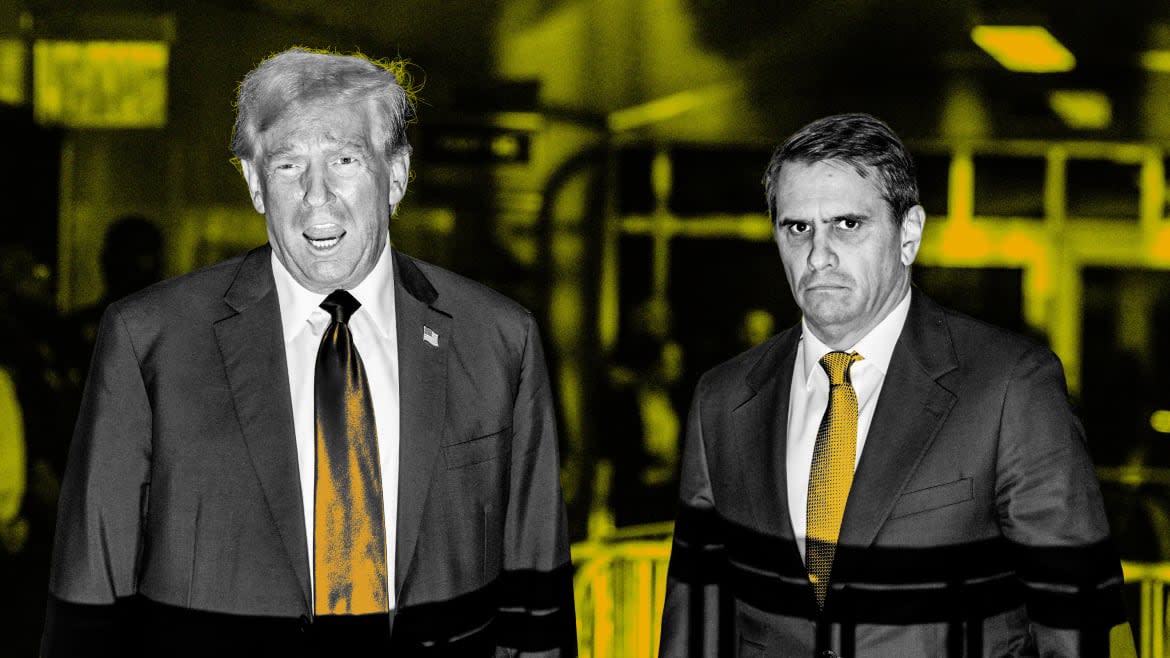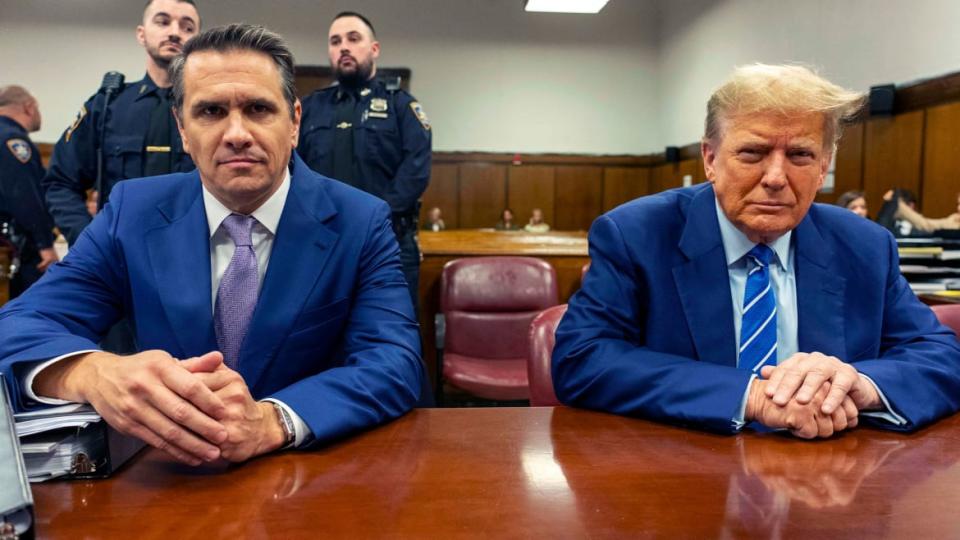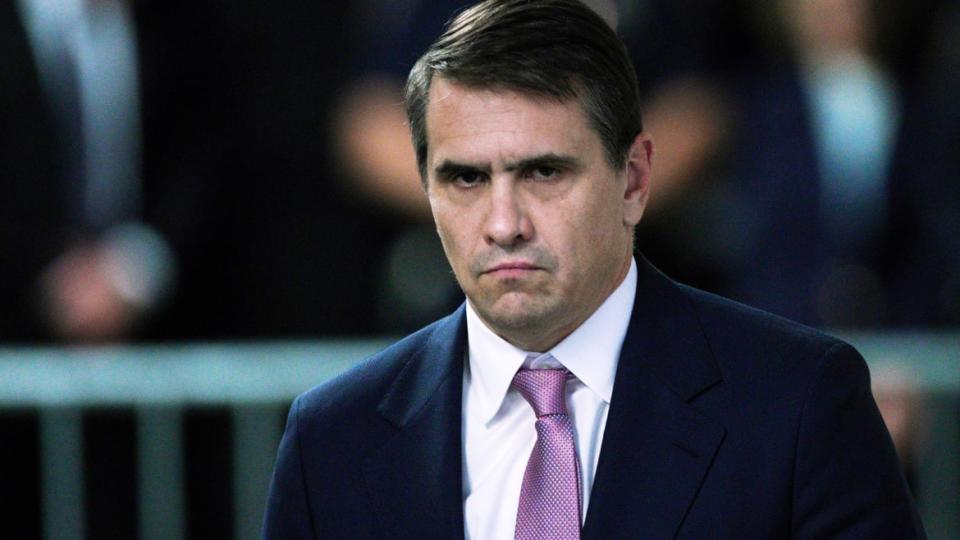Any Lawyer Who Followed Trump’s Advice Would End Up in Jail

- Oops!Something went wrong.Please try again later.
What do you call a lawyer who obeys Donald Trump’s advice?
Felon.
Okay; I’m just kidding. Some of the crimes are misdemeanors, and a few people have been indicted but not yet convicted.
The New York Times reported this week that Trump is criticizing his lawyer in the New York criminal case, Todd Blanche, for not following the former president’s instructions. According to The Times, Trump wants Blanche “to attack witnesses, attack what the former president sees as a hostile jury pool, and attack the judge, Juan M. Merchan.”
How Trump Screwed Up His Lawyers’ Ability to Do Their Jobs
For Todd Blanche’s sake, I hope he sticks to his guns.
Rich people, such as Donald Trump, rarely face consequences for their misconduct. If Trump had ever had to hold a job, he surely would have been fired—for creating a sexually hostile environment, sexual assault, getting his employer sued repeatedly for nonpayment of the employer's bills, or some other misconduct.
But Trump never faced this problem. His father set up trusts worth $1 million for each of his children in 1976, loaned Trump $14 million in the early 1980s, guaranteed construction loans, and otherwise insured that the younger Trump would always be self-employed.
When you're the boss, you don’t get fired.

Former President Donald Trump and his attorney Todd Blanche appear for the second day of his criminal trial at Manhattan Criminal Court on April 16, 2024 in New York City.
Beyond that, people are held accountable in two primary ways.
First, people get sued in civil cases. Trump and his companies did, of course, get sued—hundreds, or perhaps thousands, of times. But Trump settled the cases, stayed in business, and suffered no other consequences. Second, people get indicted in criminal cases. Until the last couple of years, Trump never paid a consequence on those grounds.
Trump has led a consequence-free life. But lawyers—litigators, in particular—do not live consequence-free lives.
When a litigator writes a brief, a highly motivated opponent (the lawyer on the other side of the case, paid to prove the scrivener wrong) writes an opposing brief, catching any misstatements in the original brief and casting even correct statements in the most disparaging light. Those briefs are then assessed by a neutral person (a judge) who rewards the honest and clever and punishes the dishonest and foolish.
When a lawyer argues orally in court, every word the litigator speaks is challenged by a motivated opponent. Lawyers learn quickly not to overstate things; you pay an immediate price for overreaching.
If litigators do overstep the bounds, the lawyer is likely to be punished in a way that affects his or her career. If the lawyer files a frivolous lawsuit or motion, the lawyer can be sanctioned—either monetarily or by referral to a bar association.

Attorney Todd Blanche appears outside the courtroom during former President Donald Trump's trial on April 30, 2024 in New York City.
Those sanctions often must be disclosed publicly—to state bar associations, whose records are generally public, or on applications to represent clients in cases in states in which the lawyer does not have a license. If a lawyer is sanctioned just once in his career, every future opponent will locate that sanction and tell the judge that you're a recidivist. Potential clients may choose not to hire you, preferring instead to hire litigators with unblemished records.
The consequences don’t stop there. To punish egregious misconduct, a state bar association can revoke a lawyer’s license to practice law.
If you’re that lawyer, that means losing your livelihood. That’s seeing consequences for your misconduct.
Indeed, that’s a consequence that Roy Cohn—the lawyer who represented Trump early in his career, and who Trump venerates—actually paid. Cohn was disbarred later in life. Trump thought Cohn was properly aggressive; disciplinary authorities thought otherwise. Rudy Giuliani, John Eastman, and others in Trump’s penumbra, are all lawyers who acted as Trump desired—and have lost, or are at risk of losing, their licenses.
Trump Being Thrown in Jail for Contempt Could Really Happen
Todd Blanche is a serious lawyer. He was a prosecutor in the Southern District of New York, perhaps the most respected prosecutor’s office in the country. He worked for years at large and well-respected law firms. He resigned from a large firm only when he chose to represent Trump, perhaps assuming that, for a criminal defense lawyer, this was the case of a lifetime. And it may well be—if Blanche hangs on to his license through this ordeal.
If you’re a serious lawyer, you do not use cross-examination to attack every witness viciously. That approach loses its impact over time, and causes the jury to dislike you, both of which make it more likely that your client will be convicted.
Serious lawyers do not attack jurors. That approach is both sure to make jurors resent you and probably get you referred to a bar association for disciplinary action.
Serious lawyers do not attack presiding judges. The presiding judge will make endless discretionary decisions during trial: Will borderline testimony be deemed admissible or inadmissible? When, if at all, will you learn the name of the witness who will take the stand tomorrow, allowing you to prepare for cross-examination? At sentencing, should the judge be lenient, or should the judge throw the book at your client?
Trump may not understand, or may not care, about these things. But Blanche does. He wants to look professional, and wants to win, and wants to maintain his license to practice law, so Blanche is more restrained than Trump prefers.
Is This Legal Strategy Trump’s Last Hope in Hush-Money Case?
There’s one other point to consider. During a long trial, things will go wrong.
That’s inevitable; you win some, and you lose some. But Trump is sure to blame Blanche for every misfortune the Trump team suffers over the next few weeks.
After all, has Trump ever in his life blamed himself when something went wrong?
Trump insists that the media is to blame when his outrageous conduct is reported in the press. The Chinese government was to blame for COVID. Dominion Voting Systems was to blame when Trump lost the 2020 election. More recently, short sellers have been to blame for drops in the value of stock in Trump’s media company, DJT.
Who do you suppose is responsible for Trump sitting in the dock in a criminal trial? Partisan Democratic prosecutors, who indicted Trump over nothing? Or Trump himself, for having violated the criminal law?
Here’s the Speech Trump Should Give at Barron’s Graduation
Things will go wrong during this trial, and Trump will blame Blanche. Blanche should accept the criticism, and he should ignore Trump’s advice.
There’s an old saying among criminal defense lawyers: “Be sure that, at the end of the trial, your client is the one who goes to jail.”
Heed your conscience, and your instincts, and the law, Todd Blanche. You may have to endure Trump’s criticism. You may get fired. You may lose. But be sure that, at the end of the trial in New York, it’s Trump, and not you, who goes to jail.
Get the Daily Beast's biggest scoops and scandals delivered right to your inbox. Sign up now.
Stay informed and gain unlimited access to the Daily Beast's unmatched reporting. Subscribe now.

